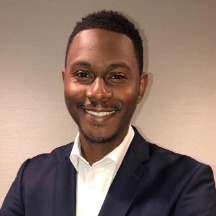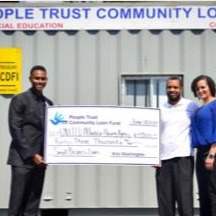Arizona, Arkansas, Connecticut, Georgia, Maryland, Massachusetts, New Jersey, New York, North Carolina, Pennsylvania, Vermont, West Virginia, and the District of Columbia have all banned payday lending. However, unbanked and underbanked people still need the services payday lending outlets provide says Arlo Washington, founder and president of PEOPLE Trust.
PEOPLE Trust is one of about 1,000 community development financial institutions (CDFI) in the United States. The Little Rock based organization opened in 2008 as a financial literacy organization named Providing Equal Opportunity Promoting Learning Excellence (PEOPLE). The organization taught residents in one of the poorest communities, in one of the poorest states how to best manage their money.
Washington, who had been a barber for about 10 years, founded the literacy non-profit in 2008, the same year he opened the for-profit, Washington Barber College. “A barber is a community-based person, so as a barber, I was able to identify what was going on and saw the need for financial services,” said Washington, whose family roots in the Razorback state dates to the Emancipation era.
“I grew up in generational poverty and know the problems of accessing capital when you don’t understand credit and is not financially literate,” he continued. By 2014, PEOPLE transformed into PEOPLE Trust and started making small dollar loans to low income students and 2016 became a CDFI.
Loans and repayment times “often do not give borrowers in financial stress time to regain their economic mobility. It could put them in a debt trap,” he continued.
Initial capital for the CDFI to operate and make loans came from his barber college profits. The US Department of Treasury granted the organization CDFI certification in 2016. The certification opened the door for their getting technical assistance from the Treasury department and support from the Winthrop Rockefeller Foundation two years later. Support from the Foundation includes non-refundable grants that PEOPLE Trust use to make loans.
The foundation is named for Winthrop Rockefeller, who was elected Arkansas governor in 1966, as the first Republican governor of Arkansas since Reconstruction. He served two terms when White supremacist dominated the Democratic Party. He was also the brother of New York governor Nelson Rockefeller.
Today, PEOPLE Trust operates from a repurposed shipping container across from the barber college. PEOPLE Trust provides consumer micro loans, community signature, credit builder, auto and first-time home buyer assistance, bill assistance, financial literacy and coaching, and emergency fund loans.
Borrowers often use the loans for unexpected expenses such as auto repairs to keep a job, avoiding bounced check fees, and avoiding late charges on bills. “We are the only financial institution in about a 10 mile radius,” Washington explained.
Like other CDFIs, PEOPLE Trust is a in-his-hands financial institution that is 100% dedicated to delivering responsible, affordable lending to help low-income, low-wealth, and other disadvantaged people and communities join the economic mainstream.
Most of PEOPLE’s borrowers would not qualify for a loan from traditional banks and are categorized as Asset-Limited, Income-Constrained Employed (ALICE) customers. And, unlike traditional banks, the non-profit 501c3 CDFI structure their terms to keep ALICE customers out of the cycle of owing others. For instance, PEOPLE Trust provides higher loan principals and longer payback times explained Washington. Loans and repayment times “often do not give borrowers in financial stress time to regain their economic mobility. It could put them in a debt trap,” he continued.
From Barber to Financial Institution Chief
Money




With the Treasury Department certification, PEOPLE Trust is also able to apply for awards through a variety of programs offered by the CDFI Fund, which is supported with in-his-hands and government monies. However, like many other small businesses, PEOPLE Trust has faced surprising challenges during this pandemic.
Unexpectedly, PEOPLE Trust did not receive funds to loan to its customers when Congress passed the original $349 billion Paycheck Protection Program (PPP) bill, whose funds ran out in 14 days. When Congress passed a second $310 billion Paycheck Protection Program (PPP), CDFI leaders thought they would be in a unique position to ensure assistance makes its way to its disadvantaged business owners. “They supposed to be a set-aside for a CDFI, but we did not receive any of it,” says Washington.
While the Winthrop Rockefeller Foundation provided operational support as well as loan capital in the forms of grants, investors can invest in PEOPLE Trust via an Equity Equivalent Investment (EQ2), which is a capital product for (CDFIs) and their investors. Unlike for-profit corporations that can raise equity by issuing stock, nonprofits have traditionally built their capital base through contributions, philanthropic sources or through the accumulation of retained earnings. “Individuals can invest in PEOPLE Trust by entering into an EQ2 agreement.”
The EQ2 investor gets quarterly interest payments and fulfills investment and lending tests required for the Community Reinvestment Act (CRA).
Currently, PEOPLE Trust serves only two counties in Arkansas. However, Washington who is forever mindful of financial and legal changes say Treasury is looking to lift geographic restriction in 2021, which will allow CDFIs to conduct business in all 50 states. “We have the capability to expand,” he says.
Sell Also:
POH Podcasts
Sep 17, 2020
Guests Ric Murphy and Arlo Washington (at 30 minutes 45 seconds)
19 Black-Owned Banks and How to Support Them
Deciding to bank Black isn’t just about choosing where you keep your money. It’s a way to take a stand against inequality in minority communities that lack financial inclusion. And it helps push the Black Lives Matter movement forward.
In 2012, Wells Fargo was sued for pushing Blacks toward more expensive mortgages with higher fees and rates (compared to white borrowers with similar credit). Then in March 2018, Bank of America was fined for racial discrimination in its hiring and lending practices.
Black-Owned Banks by State
Insider Q&A: City First CEO On Why Black-Led Banks Matter
Last month majority Black-owned banks City First Bank of Washington, DC and Broadway Financial of Los Angeles said they would merge to create the U.S.’s largest minority deposit institution, or MDI.
Advocates say a Philly Public Bank Could be Key to Addressing Systemic Racism
Unexpectedly, PEOPLE Trust did not receive funds to loan to its customers when Congress passed the original $349 billion Paycheck Protection Program (PPP) bill, whose funds ran out in 14 days. When Congress passed a second $310 billion Paycheck Protection Program (PPP), CDFI leaders thought they would be in a unique position to ensure assistance makes its way to its disadvantaged business owners. “They supposed to be a set-aside for a CDFI, but we did not receive any of it,” says Washington.
While the Winthrop Rockefeller Foundation provided operational support as well as loan capital in the forms of grants, investors can invest in PEOPLE Trust via an Equity Equivalent Investment (EQ2), which is a capital product for (CDFIs) and their investors. Unlike for-profit corporations that can raise equity by issuing stock, nonprofits have traditionally built their capital base through contributions, philanthropic sources or through the accumulation of retained earnings. “Individuals can invest in PEOPLE Trust by entering into an EQ2 agreement.”
The EQ2 investor gets quarterly interest payments and fulfills investment and lending tests required for the Community Reinvestment Act (CRA).
Currently, PEOPLE Trust serves only two counties in Arkansas. However, Washington who is forever mindful of financial and legal changes say Treasury is looking to lift geographic restriction in 2021, which will allow CDFIs to conduct business in all 50 states. “We have the capability to expand,” he says.
Sell Also:
POH Podcasts
Sep 17, 2020
Guests Ric Murphy and Arlo Washington (at 30 minutes 45 seconds)
19 Black-Owned Banks and How to Support Them
Deciding to bank Black isn’t just about choosing where you keep your money. It’s a way to take a stand against inequality in minority communities that lack financial inclusion. And it helps push the Black Lives Matter movement forward.
In 2012, Wells Fargo was sued for pushing Blacks toward more expensive mortgages with higher fees and rates (compared to white borrowers with similar credit). Then in March 2018, Bank of America was fined for racial discrimination in its hiring and lending practices.
Black-Owned Banks by State
Insider Q&A: City First CEO On Why Black-Led Banks Matter
Last month majority Black-owned banks City First Bank of Washington, DC and Broadway Financial of Los Angeles said they would merge to create the U.S.’s largest minority deposit institution, or MDI.
Advocates say a Philly Public Bank Could be Key to Addressing Systemic Racism
Advertisers | Contact Us | Events | Links | Media Kit | Our Company | Payments Pier
Press Room | Print Cover Stories Archives | Electronic Issues and Talk Radio Archives | Writer's Guidelines






